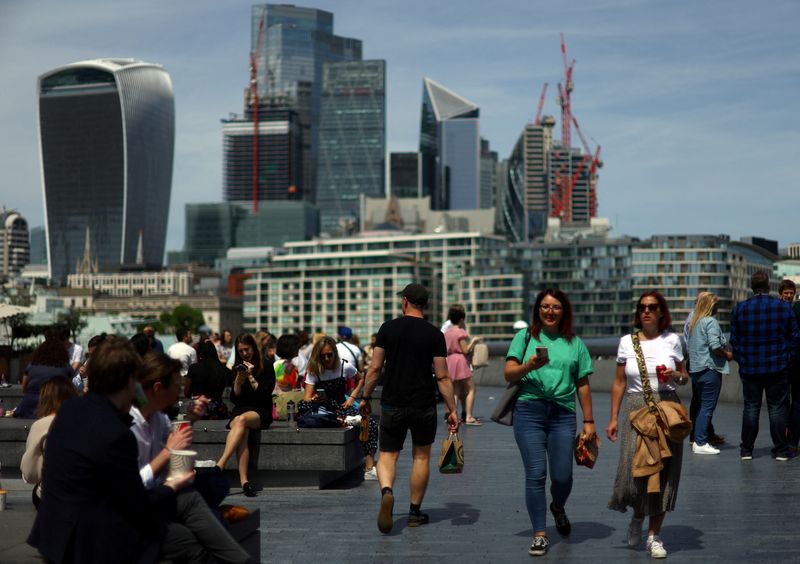By David Milliken
LONDON (Reuters) -British business activity picked up this month after a lull in the run-up to a July 4 election, bolstered by the fastest manufacturing growth in two years and the strongest inflow of new orders since April 2023, a major survey showed on Wednesday.
The figures may cheer Prime Minister Keir Starmer's new government - which is targeting faster growth to allow higher public spending - and the Bank of England too, as inflation pressures fell to their lowest in more than three years.
Although growth so far this year has exceeded most forecasters' expectations, Britain's economy has performed relatively poorly since the COVID-19 pandemic.
Among the Group of Seven rich economies, only Germany has done worse, as it took an even bigger hit than Britain from the surge in European natural gas prices which followed Russia's full-scale invasion of Ukraine in 2022.
July's S&P Global (NYSE:SPGI) Flash Composite Purchasing Managers' Index rose to 52.7 from June's six-month low of 52.3, a shade higher than the 52.6 forecast in a Reuters poll of economists.
The result was also stronger than the same survey for the euro zone, which fell to 50.1 from 50.9, below all economists' forecasts and within a whisker of recessionary territory.
British government bond futures fell after the data, pushing the yield spread between British and German government bonds to its widest since early July.
The services PMI rose slightly less than expected, while the smaller manufacturing sector beat expectations to hit its highest since July 2022.
"The first post-election business survey paints a welcoming picture for the new government, with companies operating across manufacturing and services having gained optimism about the future," S&P Chief Business Economist Chris Williamson said.
The future output component jumped from 70.4 to 74.7 in July, its second-highest reading since February 2022, helped in part by the fastest growth in export orders since March 2023.
"Companies often commented on an improvement in market confidence and the securing of new contracts, following some reports of a pause in client spending decisions prior to the general election," S&P said.
However, consultancy Capital Economics estimated that the PMI reading was only consistent with a quarterly growth rate of 0.2% in July, below the robust pace of 0.6%-0.7% which they forecast for the three months to the end of June.
"Some of the recent rebound in activity this year may have been due to catch-up growth following the weakness of activity last year," Capital Economics economist Ashley Webb said.
Britain's economy grew just 0.1% last year. The International Monetary Fund forecasts 0.7% growth for 2024.

Businesses raised prices by the least since February 2021 - driven by moderation in the services sector - and they reported one of the smallest increases in costs since January 2021.
The BoE will publish new inflation forecasts on Aug. 1, but investors have scaled back bets that it will cut interest rates from their 16-year high of 5.25% after data last week showed services price inflation and wage growth remained high.
